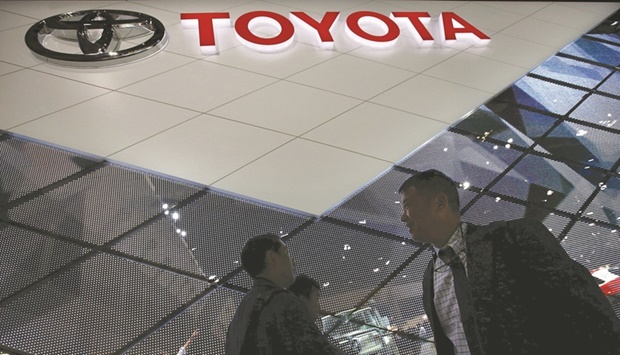Toyota Motor Corp said it is unlikely to reach its goal of manufacturing 9mn cars this fiscal year through March due to persistent chip shortages.
The world’s No 1 automaker is paring back production to 700,000 units in February, around 150,000 units lower than its original goal for the month, according to a statement Tuesday, which cited a semiconductor crunch due to continued demand across industries. Toyota didn’t set a new annual target, saying only that final output is expected to be lower than previously forecast.
Toyota already slashed its annual production outlook in September as Covid lockdowns in Southeast Asia disrupted its ability to procure key parts from the region.
“We’re in a production recovery phase, but we haven’t been able to meet as high targets as we were previously planning,” Kazunari Kumakura, head of Toyota’s purchasing group, said Tuesday. It would be “very difficult” to meet the earlier forecast for annual production under current conditions, he said.
Even with the February cut, Toyota still aims to make about 5% more vehicles next month than a year earlier, when it produced 668,001. High levels of production have been planned for March and next fiscal year, Kumakura said.
“There are still risks and with Covid continuing to spread, conditions are difficult to read,” he added.
Signs have recently emerged that supply chains were again taking a turn for the worse. In mid-December, Japan’s auto parts trade group warned that a dizzying number of issues – from lingering procurement problems in Southeast Asia to labour shortages on the US West Coast – were impacting shipments of parts and materials.
Toyota’s disclosure suggests that other Japanese automakers may face production stoppages in the weeks ahead. Toyota will suspend output at eight plants in Japan, including the Tahara facility in Aichi Prefecture, where it produces Lexus models, from 2 to 13 days in February.
“We will continue to examine the situation and consult with all companies involved in considering the use of substitutes where possible in anticipation of a continuing shortage” of semiconductor-related parts, Toyota said on Tuesday. “We will also continue to work with our suppliers in strengthening the supply chain and make every effort to deliver vehicles to our customers as soon as possible.”
On top of the chip supply challenges, China’s zero tolerance approach to Covid has led Toyota to halt work at its factory in Tianjin this past week, another troubling sign for global carmakers as the omicron variant begins to spread in the world’s biggest auto production hub.
Authorities in Tianjin, which is southeast of Beijing, have been carrying out multiple rounds of mass testing on the city’s 14mn residents and imposed restrictions on movement. The clampdowns are fuelling broader concerns about strained supply chains for manufacturers operating in China.
The Covid-Zero strategy “will have a global impact given the role China still plays in the global autos supply chain,” analysts at Fitch Solutions wrote in a recent report.
Fitch sees the recovery of global vehicle production being delayed until 2023, due to the combination of semi-conductor shortages, shipping delays and localised lock-downs, especially in China.

Visitors walk at Toyota Motor Corp’s booth at a motor show in Tokyo (file). The world’s No 1 automaker is paring back production to 700,000 units in February, around 150,000 units lower than its original goal for the month, according to a statement on Tuesday.
